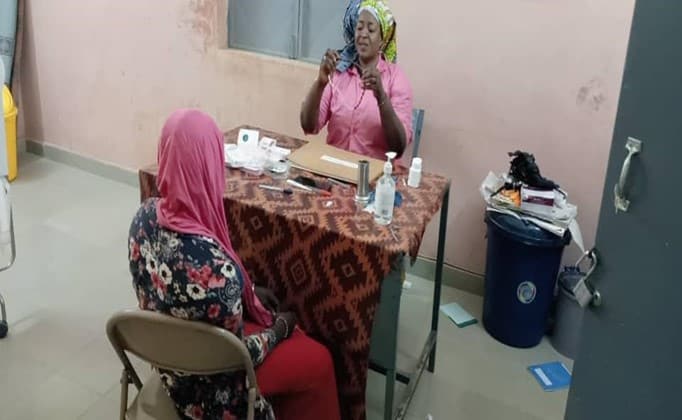Partnering with Communities in Mali to Improve Women’s Health
March 7th, 2023 | story
Souma Traore, 45, lives with her husband Mahamane and three children in Timbuktu, a city in Mali on the southern edge of the Sahara Desert. A midwife by training and a public servant at heart, Souma was in charge of the maternity ward at the Kabara Community Health Center before being promoted to technical director of the facility.
Kabara was one of the first district health centers selected to implement MOMENTUM Integrated Health Resilience project, which builds the capacity of health providers in voluntary family planning, newborn and obstetric care, immunization, nutrition, and childhood illness management. Souma was eager to collaborate with MOMENTUM because of her desire to reduce maternal and newborn morbidity and mortality. She has participated in all the project’s trainings to day, including those on achieving family planning compliance, creating greater access to care, and kangaroo mother care.
“My personal interest lies in the capacity building that the project does. It helps me to improve my performance,” says Souma. “In addition, it is the only project that works with us in the field of integrated health resilience. We have a special interest in this because we are in a difficult area in need of these tools.”
Health care access in Mali can be challenging, especially for women. Maternal, newborn, and infant mortality rates remain high, as do fertility rates, while the use of modern contraception remains low. To complicate matters, regions including Timbuktu lack sufficient numbers of basic health care providers, and highly trained health care providers are in even higher demand
Women are underrepresented in positions of responsibility within the health centers. In the Timbuktu district for example, only 20 percent of technical directors are women.
Since taking on leadership duties, Souma has had great success. Karbara has an excellent reputation due to its technical capacity and the organizational practices that Souma, herself, helped put in place. As a member of the local women’s association, she holds discussions on health topics during meetings so that attendees can learn more about maternal, child, and general health services. “We do awareness sessions for behavior change in hygiene, vaccination, infant and young child feeding, [and] on family planning. The process is slow, but … women are increasingly beginning to attend care services for themselves and their children. I am proud to observe this.”
Women are at the heart of MOMENTUM Integrated Health Resilience, not only because of its focus on mothers, newborns, and children, but also because its activities are based on clients’ needs. The project collects their input and uses it to inform annual work plans and activities. Project teams also engage community health associations and workers, nutrition support groups, and crisis and disaster management committees. This has resulted in a range of technical assistance and and supportive training activities. These synergistic approaches have proven effective and highly valued at local and national levels.
Souma notes that she is “already seeing an increase in attendance at the health center, and I link it to the advocacy supported by the project. Trust is built.” It’s women like Souma who we recognize on International Women’s Day: how challenging their roles in global health are; how indispensable they have become in building healthy communities.

A version of this story appears on the IMA/Corus website. JSI partners with IMA/Corus on MOMENTUM Integrated Health Resilience, which is funded by the United States Agency for International Development.
Photos: Nana Cissé, MOMENTUM Integrated Health Resilience
We strive to build lasting relationships to produce better health outcomes for all.